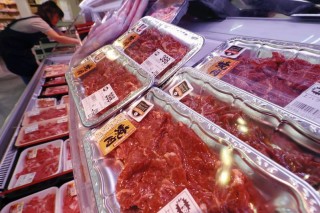Loading
Search
▼ Beef Imports Post Meaty Gains in 2017
- Category:Other
TOKYO (Bloomberg) — The nation’s beef purchases are set to climb this year as growing demand for affordable meat counters the first rise in import duties in 14 years.
Beef imports are likely to increase to the highest level since 2001 after growing more than 10 percent last year, Shiro Ohashi, executive director of the Japan Meat Traders Association, said in an interview in Tokyo on Thursday. Foreign beef is sought as a cheaper alternative to Japanese meat and fish, he said.
Beef consumption rose 6.8 percent in the seven months to Oct. 31, heading for the fastest annual expansion in at least 12 years, according to the latest data from the Agriculture Ministry. Domestic producers are unable to keep up with demand as elderly farmers are retiring without successors and as the domestic herd shrinks.
Premium Wagyu beef is becoming too expensive to buy for many Japanese as demand from overseas buyers is expanding, buoying prices, Ohashi said. Less fatty beef from Australia and the United States is becoming popular, especially among senior consumers, Ohashi said.
U.S. beef imports are expanding at a faster pace than Australian shipments, even as Japan increased tariffs on U.S. frozen beef in August, because U.S. prices remain competitive, Ohashi said. In the 11 months through November, imports of U.S. beef climbed 26.6 percent from a year earlier and purchases from Australia rose 5.5 percent, according to the Agriculture Ministry. The United States accounts for 42 percent of total imports.
Noodle-shop operator Kourakuen Holdings Corp. decided last year to turn some of its restaurants into steak houses through a franchise agreement with Pepper Food Service Co., the operator of popular “Ikinari Steak” shops. Bronco Billy Co. expects a 20 percent increase in operating profits this year as the company expands its steak restaurants.
“Regardless of the tariff increase, yen-based prices of U.S. beef have stayed low thanks to a weakening dollar,” he said. Low feed-grain prices in Chicago and an expanding American herd have also kept U.S. beef affordable, he said.
- January 27, 2018
- Comment (0)
- Trackback(0)


